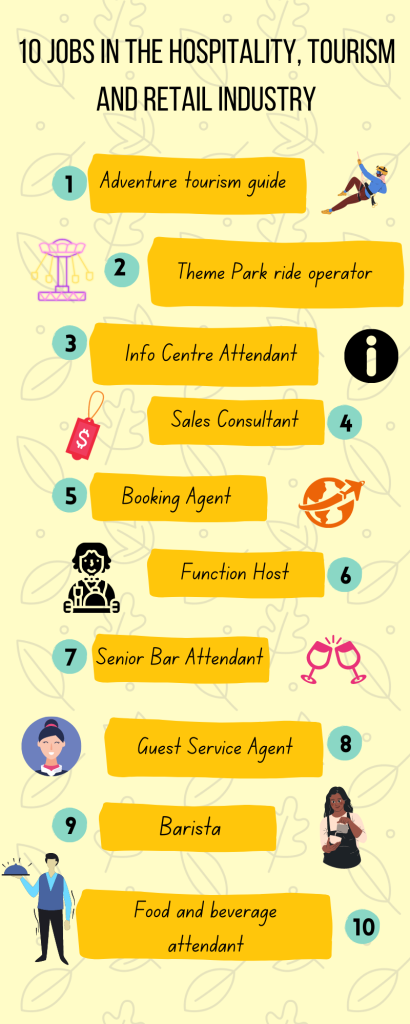
Hospitality, Tourism, and Retail’s Post-Covid Opportunities
The last two years have been among some of the harshest ever experienced by the hospitality, tourism, and retail industry. With many businesses forced to shut or move to takeaway only, countless staff lost their jobs and were forced to stay home and live off government payments. With the Covid-19 virus now being recognised and accepted as endemic by governments and the public, the tourism, hospitality, and retail sector is poised for a resurgence. The only way the recovery will happen is with trained and skilled people, who are driven to be a part of said recovery and who also want to establish themselves in a rewarding and challenging career.
Your choices are endless
The tourism, hospitality and retail industry is home to a broad variety of jobs. Most of them are also extremely accessible in terms of what qualifications are required to get into them, with a certificate III in your chosen pathway being all that is required for entry level positions. For example, with a certificate III in hospitality, you can become qualified to work in roles such as being a waiter, a gaming attendant or even a restaurant host. A certificate III in tourism can qualify you to work in museums and other cultural institutions, working as a travel agent or working as a tour guide in venues such as wineries. When combined with other qualifications, such as a dive certification, you can even find your place as a marine tourism guide or a dive tour operator. Even these are still just a sample of what is out there should you decide to pursue a career in hospitality, retail, or tourism. Here is a list of other jobs that are available to those wishing to find one in the retail, hospitality, and tourism sector:

Show me the money!
How much money you can earn is obviously one of the most important things to consider when looking at a new job or if you are thinking of changing careers. Although being hardest hit during the pandemic, the wage growth for the hospitality and retail sectors have risen higher than any other in the last year. Hospitality had the highest annual wage growth at 3.5 per cent, while retail had the largest quarterly rise of 1.2 per cent which is the biggest in six years. The wage increases, while set in the award for the sector, are also due to shortages in the labour market. This has also led to competition between some businesses who try to poach workers from each other with the offer of higher pay. These factors lead to an environment in which those working in the industry not only have earning power but are themselves an asset which can be leveraged for greater income.

Building customer trust
With the presence of covid in society, hospitality venues have had to adapt to a completely different environment in which to operate. This includes the adoption of new technology, the different cleaning protocols that they are required to follow and a changed customer profile. The technology for the hospitality sector that is new includes things such as temperature measurement tools and tabletop QR menus, with the latter being introduced as a way for less face-to-face contact between customers and staff. Even though cleaning routines in hospitality businesses are already quite vigorous because of the serving of food and drink, covid now demands an even higher standard of cleanliness.
Of greatest importance, according to page seven of this report, lies in the fact that with covid being endemic, customers need to have trust in the places they visit. Customers want to be assured that your business is taking the disease seriously and doing all they can to reduce the risk of it spreading to their patrons. Customers have also reduced their discretionary spending, meaning they will be careful in their choice of business with which to spend their money. As it is in life, so it is in business, trust is perhaps the most important ideal around which to build both your own work ethic and to contribute to building that of the business.

The customer always comes first
Being in the hospitality industry means always being focused on the customer and their needs and desires. It also means having a thick skin to deal with the complaints and requests that will be sent your way. Working in such a customer orientated environment allows you to develop skills that can be applied both professionally and in life. It lets you develop conflict resolution skills, general customer service skills, the ability to multi-task, organisational skills, and your memory is tested in remembering regulars’ names and their orders. In addition to developing these skills, to be successful you will also have to develop the ability to communicate clearly, work under pressure, quickly and accurately, and as a part of a team. Customers can not be serviced to the extent required without cohesive teamwork and communication and strong teamwork allows the workload to be spread across all members and to reduce stress on the staff. There is no greater feeling than getting together after a busy night, having a drink, appreciating the good job you have all done and appreciating what can be achieved when you all work together.

End of service
One of the most enjoyable aspects of working in hospitality, tourism, and retail, is that they can be very “social” workplaces. Working in these areas you will meet many different and interesting people, both in those you work with and the customers. Having worked in the industry myself as a commercial chef, I have experienced the trials and tribulations of working in hospitality venues, but I have also experienced how these events bring people together and create long lasting friendships. Working in hospitality is not just a way to pay the bills, it is also a lifestyle. The hours can be strange, and the customers can be difficult but at the same you will work with some of the most fun and friendly people, and this is what makes the work enjoyable.

